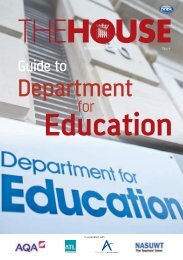Oracy
2fcBkno
2fcBkno
You also want an ePaper? Increase the reach of your titles
YUMPU automatically turns print PDFs into web optimized ePapers that Google loves.
Conclusions<br />
This report finds that while teachers say oracy matters hugely, they are concerned that quality in<br />
classrooms varies greatly. Furthermore, few schools do more than ask pupils to speak in assemblies, and<br />
a minority provide training for teachers in oracy. In the longer-term a change of mindset so that teachers<br />
and schools recognise that oracy is as critical for pupils’ development as literacy and numeracy will mean<br />
more pupils both gain access to and develop their oracy. We suggest below a number of practical steps<br />
would help set this in motion.<br />
Key findings<br />
This report set out to answer four questions:<br />
What is oracy?<br />
• <strong>Oracy</strong> can be defined as the development of children’s capacity to use speech to express their<br />
thoughts and communicate with others in education and in life, and talk through which teaching<br />
and learning is mediated. xxxviii<br />
• Teachers recognise that oracy can represent both learning to talk and learning through talk.<br />
• Primary teachers are more likely to emphasise ‘exploratory’ talk compared to their secondary<br />
colleagues, who in turn stress the importance of ‘final draft’ language used in presentations and<br />
debates.<br />
Does oracy matter?<br />
• Our synthesis of existing research, and our survey findings, case studies, and interviews with key<br />
informants show that oracy possesses a broad range of educational and personal benefits.<br />
• Teachers across the country feel oracy is critically important, and are more likely to say it is<br />
‘very important’ they develop pupils’ skills in oracy than in numeracy (although in practice<br />
this does not always play out, with factors including a lack of time limiting the quality and<br />
consistency of oracy in lessons).<br />
• Teachers feel oracy is valuable because it can underpin pupils’ development linguistically,<br />
socially and emotionally. Given the importance placed by employers on the ability to<br />
communicate, though, teachers surprisingly do not tend to link oracy with pupils’ economic<br />
and employment prospects.<br />
• Teachers primarily view the benefits of oracy in terms of their own pupils’ needs. Teachers<br />
working with more disadvantaged pupils feel strongly that oracy will help their pupils<br />
develop the skills they need to succeed in school, and later in life.<br />
How do teachers and schools develop oracy?<br />
• While teachers report regularly using pedagogy that supports oracy, interviewees express<br />
concern that classroom provision is patchy.<br />
• In general schools do little to support and extend opportunities for oracy, with a minority<br />
doing more than asking pupils to present occasionally in assemblies. Few schools<br />
evaluate the quality of pupils’ verbal contributions in lessons or communicate with parents<br />
about their children’s oracy.<br />
• Teachers in our survey overwhelmingly feel oracy is best incorporated into regular<br />
classroom teaching, but a number of interviewees say that teaching oracy discretely can<br />
both increase its status and ensure pupils from all backgrounds develop confidence and<br />
ability as spoken communicators.<br />
72<br />
xxxviii<br />
Based on Alexander, 2012: 10.




